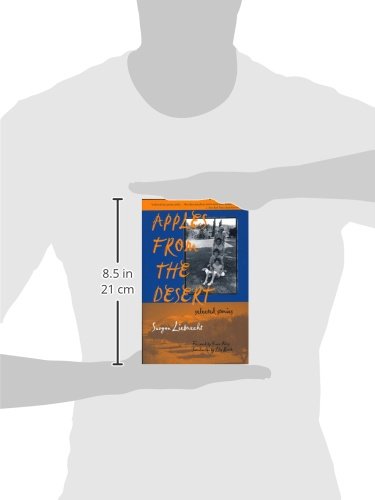Customer Services
Copyright © 2025 Desertcart Holdings Limited



Apples from the Desert: Selected Stories (The Helen Rose Scheuer Jewish Women's Series)
T**T
Love Liebrecht's literary style
I'm not a lover of short stories, but Savyon Liebrecht has written a collection of Israeli short stories that disabused me of that notion.She creates full characters and plots in eloquent, flowing style with so few words that it's astonishing. Her strong female characters come to life and literally jump off the pages.A good travel book since each vignette is only 15-20 pages enabling you to stop and start quickly without missing a beat. Highly recommended.
R**D
A gem of a collection
This is a book of stunning short stories that shed light on the lives of everyday Israelis. Each story is a gem, and the collection as a whole is a must-have for any library. Each story was new to me; I have seen them nowhere else.
C**H
unsatisfied
I expected something more than short stories mthat depressed me.I realize that we are dealing with a troubled part of the world and maybe I didn"t quite understand the views written. However, to be honest, I stopped reading the entire book because I had the feeling that all was unfinished and I wanted more to understand the attitudes...
J**Y
Great Short Story Collection
I generally don't care for short stories -- they sort of feel too superficial to me. However, this collection of short stories is exceptionally good. I read the book for a book club of mine and everyone agreed that it was a book work reading.
E**Y
a sense of doom and hope
Savyon Liebrecht's collection of short fiction, Apples from the Desert, here culled from three short story collections, and here translated from the Hebrew, is extraordinary in its range and depth. Liebrecht takes on a variety of issues which confront modern Israelis: the divide between Ashkenazi and Sephardic Jews, the oppression, both subtle and profound, of women in Israel's patriarchal society, the Arab Israeli conflict, the long shadow of the Holocaust. Reading these stories, it becomes quickly apparent to the reader which "issue" Liebrecht is going to tackle in each story. But the stories do not have a programmatic feel about them; Liebrecht never allows the moral to muddle her attempt to create a certain strained atmosphere and foreboding sense doom. Apples from the Desert is relentless both in its social critique and a penetrating analysis of what all fiction is about, what it means to be a human being in a harsh world.
M**N
Feelings expressed so well in mere words!
This is a wonderful book of short stories which contradicts the sterotypical picture of Israelis so often portrayed in the nightly news. It shows (mostly from the female point of view) the nuances of many types of Israelis, from religious to secular, from Ashkenazi to Sephardic, from Arab to Jew. In particular, it brings out the human side of each of its characters and demonstrates that feelings change from time to time and situation to situation. These are beautiful studies of human interaction.I have four favorite stories. In "A Room on the Roof", a woman's husband goes to Texas, and she decides to build a new room on the second story of her home while he's gone. Her Jewish contractor leaves her alone with three Arab laborers during the construction process. She is not sure to how to react to their presence near and in her home. "The Road to Cedar City" tells of an Israeli couple (Hassida and Yehiel) and their son Yuval who are traveling in the United States when their rented car breaks down. The wife is unhappy when she learns that she must share a ride in a minivan with another young Israeli couple and their baby who are from Jerusalem. A talkative minivan driver further complicates matters by running his mouth during the entire trip. "Mother's Photo Album" is about a Dr. Joshua Hoshen who looks into his mother's medical record after she is hospitalized in a mental institution. He pieces together her life from what he reads in her record and uses a photograph to help resolve his anguish about what he discovers. A most notable story is "The Homesick Scientist" in which eldery Zerubavel wlcomes his nephew, a well-known Israeli scientist who lives in the United States, as he returns to visit Israel after 21 years. His nephew had frequently spent summers with Zerubavel after Zerubavel's own son Uri had been killed while on reserve duty. Zerubavel, although he had eagerly anticipated his nephew's visit, isn't sure what his nephew's motives were for returning after such a long absence.
J**D
Not recommended.
The stories were boring.
E**L
Lovely set of short stories
This is a collection of 12 lovely short stories published in Israel between 1986 and 1992. Savyon Liebrecht is a child of survivors from the Holocaust and like many other children from parents who underwent the same experience, she had to deal with the trauma of the past which most often meant trying to understand and live with the "silence" from her forbears. Not only is this fact reflected in her stories, but she also addresses the problems in the interaction between Israelis and Arabs, as well as between Israelis themselves. Her stories reflect the influence of political and social conflicts in daily life and family structure. The author has a very honest approach to those conflicts, with a direct and simple style, most outstanding for its feministic and humane touch.
Trustpilot
2 months ago
2 weeks ago